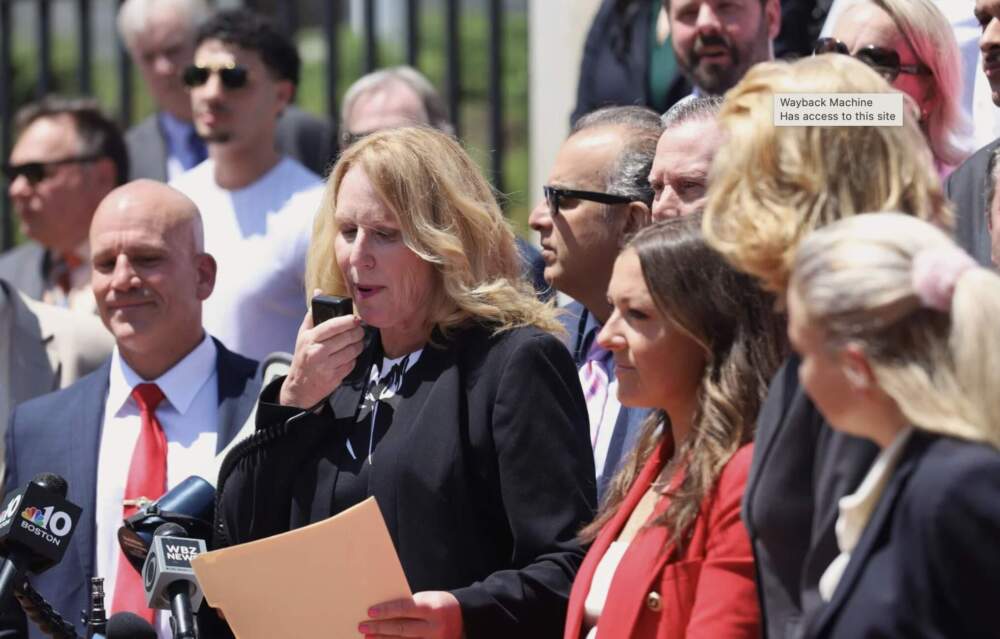
Massachusetts Trial Court leaders are promising to try to “reduce potential disruptions” as private attorneys refuse to accept new work representing indigent clients while they seek a higher pay rate.
The attorneys, known as “public defender bar advocates,” represent clients who cannot afford legal counsel.
Hundreds of the attorneys stopped taking these clients on Tuesday after months of efforts to increase their hourly wage. They rallied at the State House Tuesday urging lawmakers to appropriate funds to hike their pay.
Organizers of the bar advocates say Massachusetts pays these attorneys $65 to $85 an hour, depending on the case. The rate goes up to $120 an hour to represent clients accused of murder.
They say the rate is lower than those in neighboring states, with Maine and New York both paying $158 an hour, New Hampshire paying $125 to $150, and Rhode Island paying between $112 and $142. The attorneys are paid with public funds so the state can meet defendants’ constitutional right to counsel.
“The consensus is we’re not going to do this anymore,” said attorney Jennifer O’Brien. “Nobody wants to get out of law school with all that debt and make $65 an hour.”
O’Brien said because the attorneys are not organized as a group, she doesn’t know exactly how many have stopped taking new criminal cases. However, she estimates that at least half of the state’s almost 2,600 bar advocates will not be representing new clients for now because of their hourly wages. One of the tipping points, O’Brien said, was when the public defenders learned that the state pays other courthouse workers, such as private investigators, a higher rate.
“I have my own private practice and I like practicing criminal defense and giving back to the community,” O’Brien said. “But there comes a point when it becomes offensive.”
Bar advocates say they will continue representing their existing clients, but will not accept new ones.
“This is sacred work,” said attorney Mara Dolan, who is a member of the Governor’s Council. “This is our hearts and souls caring for the people of this country, upholding the Constitution at a time when it is in greater peril than it has ever been.”
Even before Tuesday’s effort to have large numbers of attorneys stop accepting new criminal cases, bar advocates said many of their peers had already stopped taking indigent cases because they need to earn more to afford Massachusetts’ high cost of living.
“The crisis is here,” said bar advocate and Barnstable County attorney Sean Delaney at the rally Tuesday afternoon. “Hundreds and hundreds of bar advocates throughout the state have left being bar advocates because they could no longer justify receiving the low hourly rate. And it’s across all panels — District Court, Superior Court, homicides, appeals and mental health.”
A spokesperson for Gov. Maura Healey referred questions to the Trial Court.
It’s not yet clear what the bar advocates’ actions will mean for those who are arrested and cannot afford legal representation.
There were no formal reports about how court proceedings were affected Tuesday. Many legal experts said they expect the effects of the attorneys action to become evident over the summer.
If someone is arrested on a minor charge, a judge can set a future court date for when an attorney is available. For those in custody on more serious charges, previous court rulings have said that if there are no lawyers able to represent a criminal defendant within seven days, the defendant must be released. If they are not represented for 45 days, the charges must be dismissed.
“We are entering a dangerous period where people accused of crimes may be jailed without a lawyer or released without a hearing — not because of the law, but because the commonwealth has failed to meet its constitutional obligations,” said attorney Shira Diner, president of the Massachusetts Association of Criminal Defense Lawyers. “This is not sustainable. It is not just.”
The bar advocates handle about 80% of cases involving indigent clients, with the rest represented by the state public defender agency, the Committee for Public Counsel Services (CPCS). The agency employs salaried attorneys to represent those who cannot afford counsel. CPCS has said it will take on some of the bar advocates’ cases, but it does not have the resources to represent all the clients and cannot take cases that would present a conflict of interest with other clients. It is promising to work with the court system to try to “avoid a constitutional crisis.”
“Mitigating the damage of a counsel crisis will necessitate significant coordination between the courts, district attorneys, and CPCS,” CPCS Chief Counsel Anthony Benedetti wrote in a letter to the chief justice of the Trial Court. “It will also require patience and understanding on all sides as we grapple with the increased administrative efforts needed to deal with the situation.”
State lawmakers have considered proposals to increase the attorneys’ pay. The bar advocates say they want to see promises from the Legislature and the governor that their pay will soon rise to a level comparable with other states.
“It is an expensive process to provide indigent defendants with counsel,” said former Massachusetts Bar Association president Marsha Kazarosian, “but that’s part of what people’s rights are under our constitution.”



